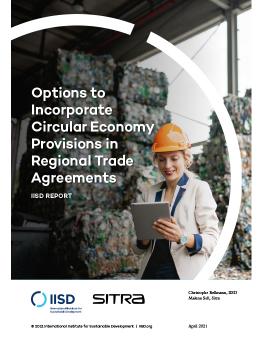
Options to Incorporate Circular Economy Provisions in Regional Trade Agreements
This report explores ways in which trade policy can further support a transition to a more circular economy using regional trade agreements (RTAs) as a vehicle. In doing so, it suggests possible options to incorporate circular economy-related provisions in future RTAs, building on precedents with similar objectives in agreements currently in force or under negotiation.
-
Some trading blocs have started including circular economy provisions in their RTAs—with the European Union taking the lead—but so far these references remain largely embryonic.
-
Circular economy-related provisions may be integrated into horizontal chapters (e.g., on environment or sustainable development, trade in goods, services, subsidies, investment, or government procurement) by making specific references to circularity.
-
Circular economy objectives can also be reflected in dedicated sectoral chapters or stand-alone annexes or included as specific annexes attached to broader chapters (e.g., technical barriers to trade).
Many countries and economic blocs are beginning to embark on transforming their economies into a circular model. This transition entails a deep paradigm shift set to address the triple crises of climate change, nature and biodiversity loss, and the unsustainable use of natural resources. In today’s globally connected economy, international trade will play a critical role in this equation by exploiting comparative advantages and economies of scale. Cross-border exchanges of goods and services related to the circular economy already occur at all stages of the value chain, including upstream services related to circular design, goods for refurbishment and remanufacturing, and trade in waste and secondary materials.
Governments can use a range of trade-related policy measures, including tariff and non-tariff measures, to encourage the transition away from the take–make–waste economic model. Regional trade agreements, among other mechanisms, can be a vehicle for cooperation on the trade and circular economy interface between specific trading partners. The European Union, for example, has a Circular Economy Action Plan, which will require mainstreaming circular economy objectives in its free trade agreements. As a contribution to this emerging debate, this policy brief explores possible options to incorporate circular economy-related provisions in trade agreements based on existing precedents.
You might also be interested in
Agreement on Climate Change, Trade and Sustainability: A landmark pact for trade and sustainability
The ACCTS pact, signed by Costa Rica, Iceland, New Zealand, and Switzerland, aligns trade and environmental policies, tackling fossil fuel subsidies, eco-labels, and green trade.
December 2024 | Carbon Minefields Oil and Gas Exploration Monitor
In November 2024, 23 oil and gas exploration licences were awarded across five countries, with Russia granting the licences that account for the largest portion of embodied emissions.
The Cost of Fossil Fuel Reliance
Government support for fossil fuels reached at least USD 1.5 trillion in 2023, new data shows.
Increased Support Needed to Achieve India's Clean Energy Goals
India is on track to achieve many of its 2030 clean energy goals but needs to step up government support measures to accelerate the deployment of offshore wind, electric vehicles, and green hydrogen, according to a new report.